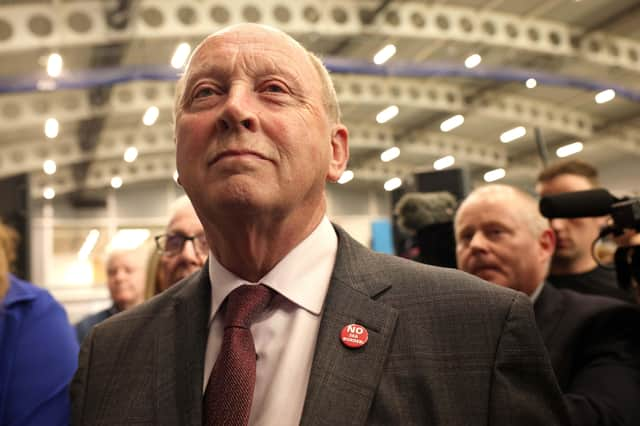The TUV got 8% of the vote in Northern Ireland and can no longer be ignored


From a TUV point of view it is important to put to bed a myth which is being perpetuated by some. Rather than damaging unionist representation in the assembly, TUV voters maximised it with 13 MLAs – 3 UUP and 10 DUP – elected with the help of TUV transfers. As the letter from Lord Caine, under secretary of state for Northern Ireland, acknowledged “DUP losses were minimised due to TUV transfers”.
Not only were we the only unionist party to increase our vote our message of encouraging voters to transfer down the ballot to all pro-Union, anti-Protocol candidates was heeded.
Advertisement
Hide AdAdvertisement
Hide AdUnionists who owe their seats to transfers from a party which rejected the idea of a Sinn Fein first minister would do well to pause and reflect before rushing to answer the question both the DUP and UUP studiously avoided during the election – will you provide a deputy to a republican first minister?


But the biggest question thrown up by last week’s election is one of legitimacy. While it took an average of 6,864 votes to elect an Alliance MLA and 7,360 to elect a DUP MLA, a massive 65,788 TUV votes (almost 8% of first preferences) resulted in just one TUV seat. This is hardly a just result under a system which is supposedly designed to produce results which are proportional to the vote received.
There are also issues which deserve to be highlighted which suppressed the TUV vote. ‘Commentators’ who go through the revolving doors of the BBC and UTV to project their views on to the public rather than reflect what is taking place have questions to answer.
Whatever happened to their ‘Beattie Bounce’ or ‘Green surge’? Why didn’t anyone notice what actually did happen —the Allister Avalanche?
Advertisement
Hide AdAdvertisement
Hide AdThe signs were there for those who wanted to see them with both Lord Ashcroft and LucidTalk polls showing a massive upsurge in TUV support. This was dismissed by the talking heads afforded a platform by broadcasters. Not only that, but they frequently denigrated TUV, dismissing our candidates in a fashion which didn’t happen when they came to any other party.
Arguments for the inclusion of TUV in TV debates were dismissed, denying a party which was polling at a similar level to the SDLP vital publicity on the eve of poll and treating us as a category of party which an abundance of evidence showed we did not deserve.
Yet for all the snide remarks about TUV candidates, unlike the DUP and Sinn Fein TUV was happy to provide Good Morning Ulster access to our candidates in Lagan Valley and Newry and Armagh. In the former case, Sinn Fein wheeled out John Finucane while in the latter Gavin Robinson offered his insights into the challenges facing Newry and Armagh.
What of the challenges facing wider unionism?
Questions must be asked about the disastrous decision to reduce constituencies from six to five seaters. Had this not been agreed in a carve up between the DUP and Sinn Fein unionism would have additional seats in many constituencies west of the Bann including Fermanagh and South Tyrone, Newry and Armagh and West Tyrone.
Advertisement
Hide AdAdvertisement
Hide AdIt would also mean that the unionists of West Belfast would have a voice in Stormont. When the seats were reduced in the 2017 election, 16 of the 18 seats lost were unionists – a blow from which unionism has not recovered.
Questions must also be asked about why an assembly in which unionism is the largest designation faces having a Sinn Fein first minister foisted upon it. Bad as the Belfast Agreement was, such a situation could not have arisen under the 1998 deal as the first minister always came from the largest designation rather than the largest party. That changed because of the St Andrews Act.
The DUP got four assembly elections out of ‘vote for us to stop a Sinn Fein first minister’. In the most recent election the pitch was vote for us to stop a border poll. What is the trajectory of such tactics?
The DUP played Russian roulette with the constitutional status of NI in order to shore up their vote, dismissing tens of thousands of unionist votes as worthless because they were not cast for their party. The key statistic unionists should be focused on is the total unionist vote vs the total nationalist vote and the total number of unionist MLAs vs the total number of nationalists. In both unionism is ahead yet that statistic has been lost.
Advertisement
Hide AdAdvertisement
Hide AdWhere should unionism go now? One thing is for certain — continuing on the road which we have been on will lead to disaster.
The blasé acceptance by unionism of the Dublin government having a say in talks about our future must cease.
The case for devolution which is only possible if one agrees to implement the protocol is threadbare.
The rise of TUV – Jim Allister returns to Stormont as the voice of almost 20% of unionists – shows that unionism still wants to resist the protocol.
Advertisement
Hide AdAdvertisement
Hide AdMany loyalists connected with our ‘Had Enough?’ message. Whatever some may say, unionism is in no mood to go quietly into the night.
Those who voted TUV because we put our pro-life and pro-traditional family values position front and centre of our campaign sent a message to the DUP that such things remain important in much of Protestant Ulster whether broadcasters care to acknowledge it or not. The many elected off the back of TUV transfers would do well to reflect on what such voters will think of them propping up an Assembly which, on issues like conversion therapy, is decidedly more liberal than Westminster.
Some have called for a united unionist party. I’m sceptical about such a proposition, particularly as I suspect many of those calling for it see it as a means of propping up the system which has brought us to the point we are at now rather than reversing a disastrous trend.
If unionism is going to seriously reflect on where it goes from here it would do worse than return to first principles and particularly the foundation document of Northern Ireland where our forefathers and mothers pledged to defend “for ourselves and our children, our cherished position of equal citizenship in the United Kingdom”. Such resolution would never have seen a unionist build border posts between us and the rest of the UK.
Advertisement
Hide AdAdvertisement
Hide AdSuch resolution would never have allowed a form of government in NI which is alien to anywhere else in the UK. Such resolution would have prevented the removal of the symbols of the state from official places like police stations and court houses.
There will be other profound challenges down the line but in order to face them with any hope of success it is essential that mistakes are recognised and not repeated.
• Samuel Morrison is the press officer for Traditional Unionist Voice and assistant to Jim Allister
• Other commentary:
Advertisement
Hide AdAdvertisement
Hide Ad• Peter Robinson May 11: Ignore those who are urging DUP to just go back into Stormont
Advertisement
Hide AdAdvertisement
Hide Ad• Editorial May 11: Liz Truss hints at action on NI Protocol but unionists are right to be wary
• Ruth Dudley Edwards May 10: The nationalist vote is nowhere near enough for border poll
• Editorial May 10: If Irish language gets pledge today so must an overhaul of protocol
• Ben Lowry May 9: The TUV vote surge should have been one of the main stories of the election
Advertisement
Hide AdAdvertisement
Hide Ad• Owen Polley May 9: Unionists have an issue with sectarian SF, not with nationalism
• Henry McDonald May 9: A few facts are in order amid breathless reportage about SF
• Emma Little Pengelly May 9: There has been no increase in the nationalist vote in 25 years
• Editorial May 9: It is clear that unionists need to have option of voting for a liberal party
Advertisement
Hide AdAdvertisement
Hide Ad• Ben Lowry May 7: Unionism now faces a considerable challenge in how to go forward
• Henry McDonald May 7: Sinn Fein’s day in the sun but no new dawn for Irish unity
• Editorial May 7: Unionism more than ever needs London’s help on the protocol
• Ben Lowry May 7: Unionist overall vote stays ahead of nationalist total, albeit narrowly
• Brian John Spencer: Unionism was given no wriggle room by nationalism